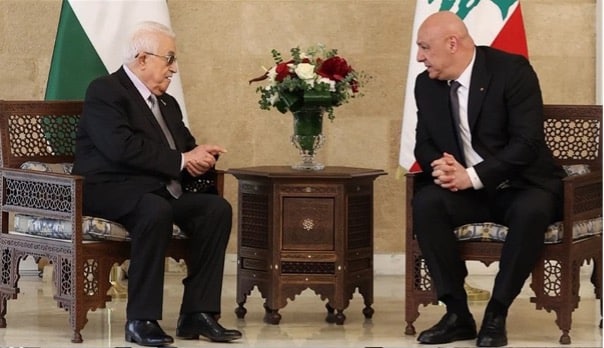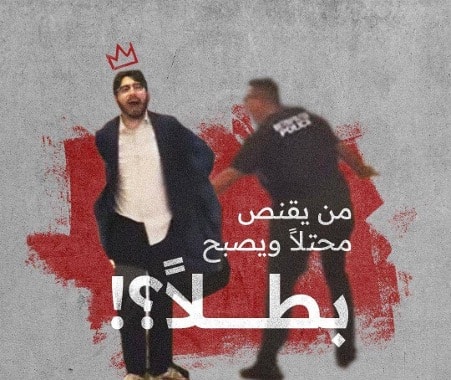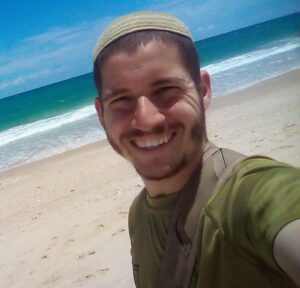
Overview
- An American citizen from Chicago shot and killed two staffe members of the Israeli embassy in Washington, D.C. The attacker shouted “Free, free Palestine” and declared that he carried out the act for Palestine. The victims were Yaron Lichinsky and his soon-to-be fiancée Sara Milgram. They were killed outside the Jewish Museum after leaving an event organized by the American Jewish Committee.
- Details of a newly negotiated deal were released and it includes a 60-day ceasefire, the release of 10 live hostages and half of the deceased on the first day, delivery of medical information about the remaining hostages, the entry of full humanitarian aid, and discussions about ending the war consistent with Israel’s terms.
- The Prime Minister’s Office announced that humanitarian aid and food would be allowed into Gaza in minimal quantities to prevent a humanitarian crisis and halt the operation temporarily.
- Netanyahu said Israel is ready to end the war now if all hostages are released, Hamas leadership goes into exile, and Gaza is demilitarized. He also mentioned implementation of the “Trump plan” of emigration, warning that if these conditions are not met, Hamas as a murderous terrorist organization will regenerate.
- Israeli Ambassador to the U.S., Yechiel Leiter, believes Syria and Lebanon could join the Abraham Accords and normalize relations with Israel before Saudi Arabia does.

Gaza
Hostage Deal
On May 18, details of a newly negotiated deal were published. The deal includes a 60-day ceasefire, the release of 10 live hostages and half of the deceased on the first day, delivery of medical information about the remaining hostages, the entry of full humanitarian aid, and discussions about ending the war consistent with Israel’s terms.
Hamas demands that any such ceasefire agreement should be guaranteed by the United States and announced by President Trump, with Special Envoy Steve Witkoff signing the deal and shaking the hand of Khalil al-Hayya, which would effectively represent official normalization of Hamas.
Prime Minister Netanyahu held a press conference concerning the start of the new military campaign in Gaza. He explained that Hamas aims to obtain guarantees through a UN Security Council resolution that would restrict Israel’s ability to continue the war. Such a resolution would prevent the US from unilaterally reversing the decision, and require UN member states to enforce the ceasefire, ensuring the war stops while Hamas continues to exist as the armed ruler in Gaza. Netanyahu warned that Israel cannot accept any comprehensive agreement that forces an end to the war without destroying Hamas.
On May 20th, Netanyahu ordered part of the negotiating team to return from Doha due to Hamas’s refusal to compromise in talks. Qatar’s Prime Minister accused Israel of wanting only a partial deal, while Hamas demands a full agreement.

Operational
Gideon’s Chariots
At 16:20 on Sunday, May 18, the military operation “Gideon’s Chariots” officially commenced. The Chief of Staff held a situation assessment in the Gaza Strip, stating that the goal is to break Hamas’s fighting capability, decisively defeat it, and free all the hostages. Additionally, the operation aims to provide the political leadership with enough flexibility to reach a new deal.
IDF Spokesperson Brigadier General Efi Deferin declared that the conflict is transitioning from Operation “Oz u’Cherev” (Strength and Sword) to Operation “Merkavot Gideon (Gideon’s Chariots).” The Gaza Strip will be divided into different sections, and the population will be transferred from place to place, applying lessons learned from previous operations. The operation began with a preemptive strike and will be based on three main principles:
- Achieving operational control over the areas of activity and complete the clearing of tunnels above and below ground.
- Strategically, moving the population.
- Striking Hamas’s infrastructure to the point of regime collapse.
There are currently, five divisions fighting in the Gaza Strip: Gaza Division, 36th, 98th, 252nd, and 162nd Divisions. They are still active mostly in the periphery of the Strip. The Indonesian Hospital and the Nasser Hospital were identified as Hamas terror command centers and were consequently bombed, damaging a medical equipment warehouse.
- In recent weeks, Golani fighters have been clearing the Morag area, and in recent days, alongside Yahalom combat engineers, they have identified and destroyed the tunnel network.
- The IDF is preparing to re-divide northern Gaza by capturing the Nezarim Corridor, which would isolate Gaza City—the core area where approximately 200,000–300,000 civilians have not evacuated. The strategy is to implement a siege with a new division point (Point 4) south of the route along Salah al-Din Road to convince the population to evacuate.
- Saudi newspaper Al-Hadith reported that Mohammed Sinwar, along with 10 other Hamas commanders, was killed in a tunnel attack near the European Hospital in Khan Yunis. Alongside him, Rafah Battalion Commander Mohammed Shabana was also eliminated. Israeli Defense Minister Katz stated there are indications of his killing as well, but did not confirm his death. If both are confirmed dead, the only remaining survivor of the original Hamas leadership before the war began will be Ezz al-Din al-Haddad
- The Israeli military is prepared to capture additional territory in the Gaza Strip if Hamas does not agree to release the remaining hostages it holds captive, warned IDF Chief of Staff Lt. Gen. Eyal Zamir in a video statement.
- In Khan Yunis in southern Gaza, daily protests are erupting against Hamas’s rule and demanding an end to the war. Hundreds of Gazans shout slogans against senior Hamas figures abroad, such as “Ya Zahari, Ya Hamdan, we want to live here”. Other chants include “Yalla Yalla Hamas Baraa Baraa” (Hamas out, out!)

Humanitarian Aid
- The Prime Minister’s Office announced that humanitarian aid and food would be allowed into Gaza in minimal quantities to prevent a humanitarian crisis and halt the operation temporarily. There do not appear to be any reliable precautions taken to prevent Hamas from looting the trucks bringing the aid, yet there seems to be pressure coming from the Trump administration to allow food in, likely the residual affect of Trump’s recent visits to the Gulf and statements by both Trump and Witkoff, urging Israel to facilitate the distribution of aid. The Trump administration wants to be seen in the Arab world as preventing a hunger crisis in Gaza and has demanded that Israel permit the entry of food into Gaza.
- On May 19th, only five trucks were allowed into Gaza, but by Tuesday, 93 trucks entered. Masses of displaced persons are fleeing westward from Khan Yunis toward the El Mowasi area, accompanied by renewed protests against Hamas with chants of “Hamas out” and calls from Gaza residents to surrender and accept the deal.
- Starting in the coming week, through American private companies and with IDF security, the direct food distribution mechanism to Gaza’s population will begin operation. Recently, an American team underwent training for the mission, and the Gaza population has been informed about the distribution mechanism. Four distribution centers will be established—three in the Morag corridor area and one slightly south of the Nezarim Corridor. This arrangement will facilitate the evacuation of the population from northern Gaza, while the fighting is expected to intensify.
Gaza Humanitarian Fund
- Israel may allow aid groups already operating in Gaza to continue handling non-food assistance, while leaving food distribution to a newly established Gaza Humanitarian Foundation (GHF), according to a letter obtained by The Associated Press. The letter, dated May 22 and authored by Jake Wood, head of the Israel-approved GHF, addressed to COGAT, states that Israel and GHF have agreed to let non-food humanitarian aid—such as medical supplies, hygiene items, and shelter materials—be distributed under the existing UN-led system. The letter also acknowledges that GHF lacks the technical capacity and field infrastructure to manage these distributions independently
- The Washington Post published a report based on interviews with several Israeli security officials and other sources, and examination of “hundreds of pages” of classified documents. It claims a deliberate effort to conceal Israel’s connection to the Gaza Humanitarian Foundation (GHF). Despite this, Israeli Ambassador to the U.S. Yechiel Leiter revealed in an interview that Israel was involved in establishing the Gaza Humanitarian Foundation.
- A GHF spokesperson told The Post that the foundation had already raised $100 million from a secret donor, calling it a “significant achievement.” A former Israeli military official was quoted saying that some IDF officers “want the program to fail” and prefer the current system, in which aid is distributed by the UN and other international organizations.
- The core idea of the new program is that food will be delivered directly to Gazans, with each person receiving a family-sized food package, replacing the chaotic distribution where it is alleged much aid falls into Hamas’s hands. Hamas reportedly sells the aid at exorbitant prices to finance paying its operatives, ruling Gaza, and fighting the IDF. Israel’s aspiration is that by breaking the Gazan population’s dependence on Hamas, the system will encourage them to move south toward humanitarian zones where food is accessible.
- The report highlights that at the end of 2023, the Coordinator of Government Activities in the Territories (COGAT)—the IDF unit responsible for coordinating Gaza aid—began initiating the “humanitarian bubbles” plan promoted by former Defense Minister Yoav Gallant. This plan aimed to concentrate Gazan civilians in safe areas outside active combat zones. A similar plan was also suggested by the IDSF.
- The United Arab Emirates admitted that 23 out of 24 aid trucks delivered in recent days to Gaza were looted, and the World Food Program confirmed 15 of its trucks were looted. Armed gangs seized trucks, and during a firefight with Hamas, several were killed. Israel eliminated six Hamas members responsible for executing 11 “aid thieves” — nine by shooting and two by hanging.

Diplomatic
- The governments of Britain, France, and Canada threatened sanctions and condemned Israel, with sharp statements from leaders including the British Prime Minister, British Foreign Secretary, and French Foreign Minister. They threatened to suspend trade agreements with Britain and delay agreements with the European Union. European officials issued harsh condemnations accusing Israel of genocide and demanded an immediate halt to the war and entry of humanitarian aid.
- Prime Minister Netanyahu responded that it is necessary to allow minimal aid to ease pressure, noting that even senior Republican senators supportive of Israel are pressuring for aid entry, which he argued must be prevented to continue the fighting.
Terrorist Attack Against Israeli Embassy Staffers
An American citizen from Chicago shot and killed two Israeli staffers at the Israeli embassy in Washington, D.C. The attacker shouted “Free, free Palestine” and said he carried out the act for Palestine. The victims were Yaron Lichinsky and his soon-to-be fiancée Sara Milgram. They were killed outside the Jewish Museum after leaving an event organized by the American Jewish Committee. Sara was an American citizen, while Yaron immigrated to Israel from Germany.
Jihadists criticized that instead of a Muslim carrying out the attack “in the name of jihad for Islam,” it was a non-Muslim who did the deed. They described this as a “shame” and a “weakness of the Muslim nation.” Beyond this perverted criticism, the jihadists implicitly called for Muslims to carry out attacks in the name of Islam, arguing that failure to perform jihad against “infidels” is weakness. They seek to motivate Muslims to conduct similar attacks to address this “weakness” and prove the “strength of the Islamic nation.” These come from popular Telegram channels from all over the middle east.
Channels supporting Hamas praised the attacker Elias Rodriguez, who waited 15 minutes after committing the shooting at the Jewish Museum and killing two Israeli embassy employees before police arrested him. Islamist channels across the web glorified Rodriguez and began urging Muslims to carry out similar attacks.
Domestic Israel
- The Security Cabinet approved the construction of a security barrier along the eastern border, stretching 425 km from southern Golan Heights to Eilat. This will be a multi-layered system including command centers, deployment of light forces, advanced sensors, and detection and warning capabilities. Additionally, a five-year plan was formulated to strengthen strategic control over the Jordan Valley, involving the establishment of pre-military academies, new settlements and agricultural farms.
- As of recent data, only 1,212 ultra-Orthodox men—five percent of the 24,000 who received initial draft notices since July 2024—have started the enlistment process, according to the head of the IDF Personnel Directorate’s Planning and Personnel Management Division.
- In defiance of the Attorney General’s order, Prime Minister Benjamin Netanyahu announced on Thursday evening the appointment of IDF Maj. Gen. David Zini as the next Shin Bet chief. This announcement came a day after the High Court of Justice ruled Netanyahu’s firing of outgoing Shin Bet chief Ronen Bar was “improper” and “unlawful,” citing a conflict of interest. Attorney General Gali Baharav-Miara informed Netanyahu that he is barred from appointing a new Shin Bet chief because of his conflict of interest related to the Qatar gate probe.

Prime Minister Netanyahu’s Press Conference
- Prime Minister Netanyahu highlighted achievements on various fronts of the war and dismissed the claim that there is a lack of full coordination with the Americans, in regards to the current US-Iranian nuclear negotiations, the American ceasefire with the Houthis, pressure on Israel to agree to a ceasefire in Gaza, or lifting sanctions on al Julani in Syria. Netanyahu hinted that Israel reserves its right for a military option against Iran if a bad deal is reached.
- Netanyahu stressed that humanitarian aid must be allowed in to Gaza, in order to maintain American and Western support for the war. He outlined a three-stage aid plan:
(1) immediate entry of food to prevent a humanitarian crisis and enable continued fighting; (2) establishment of food distribution points in Gaza under a private American company’s supervision and IDF security (to begin soon); and (3) clearing of the Morag area from Hamas operatives, directing the population there.
- Netanyahu said Israel is ready to end the war now if all hostages are released, Hamas leadership goes into exile, and Gaza is demilitarized. He also mentioned implementation of the “Trump plan” of emigration, warning that if these conditions are not met, Hamas as a murderous terrorist organization will regenerate.
Judea and Samaria
- At the Arab League Summit, Palestinian Authority President Mahmoud Abbas called on Hamas to lay down arms and relinquish control of Gaza to the PA, but Hamas rejected this call. It appears the summit supported the PA as the sole representative of the Palestinians, and that Gaza should be transferred under its control.
- A UN summit on the Palestinian state is expected between June 2-4. French President Macron announced his intent, alongside Saudi Arabia, to unilaterally recognize the establishment of a Palestinian state west of the Jordan River, though it is uncertain if he will follow through. Prime Minister Netanyahu sharply condemned Macron’s step.
- On May 21, a delegation of 25 diplomats from various Arab and European countries arrived in Jenin. Despite clear instructions about permitted areas, the delegation was led into a restricted military zone where two soldiers fired warning shots to disperse them. No injuries were reported. The Israel Defense Forces apologized for the event and announced an inquiry, but also noted the delegation had strayed from a pre-approved route.
- Ahead of Jerusalem Day, channels supporting Hamas are issuing toxic incitement urging Palestinians and Arab Israelis to confront and attack during the Flag March.
Lebanon
Diplomatic
- Deputy Special Envoy Witkoff’s deputy, Morgan Ortagus, is expected to visit Lebanon this week. Recently, at an economic forum in Qatar, she stated the Lebanese government must do more to disarm Hezbollah, not only south of the Litani River but throughout the country. It is possible she will discuss the possibility of Lebanese normalization with Israel during her visit.
- Palestinian Authority President Mahmoud Abbas visited Beirut and met with Maronite Christian, Lebanese MP, Gebran Bassil to promote the disarmament of Palestinian terrorist factions. Bassil apparently wants to first disarm groups in Palestinian refugee camps in Beirut, Sidon, Tyre, and Tripoli, before taking similar steps with Hezbollah. Both sides agreed that Palestinian camps in Lebanon cannot be safe havens for extremist groups, and the Palestinian side confirmed a commitment to not use Lebanese territory for military operations.
- French sources report that the Lebanese government signed an agreement with the Palestinian Authority to begin implementing a plan to collect weapons from Palestinian refugee camps and to take practical steps to improve their economic and social rights.
- Lebanese authorities claim they have decided to “limit weapons” in the country under growing U.S. pressure to disarm Hezbollah.
- The balance of power is changing in Lebanon with the weakening of Hezbollah. The increased American, French and Saudi influence may stabilize the fractured country and bolster moderate political forces. When Hezbollah is weakened enough and state institutions strengthened, Lebanon has the potential to be the next country to join the Abraham Accords. In fact, Israeli Ambassador to the U.S., Yechiel Leiter, believes that Syria and Lebanon could join the Abraham Accords and normalize relations with Israel before Saudi Arabia does.

Operational
- Large caches
Syria
Military Activity
- According to “Middle East Eye”, Israel and Turkey are establishing the “Co-Tadmur” line. Israel is prepared to accept Turkish military presence on the ground in Syria, including infantry and military vehicles, but not air defense systems. This is apparently due to American support for Turkish deployment in Syria, especially to conduct active fighting against ISIS.
- Sources told Al-Akhbar that some Syrian opposition factions are holding secret meetings in Turkey, with the goal of requesting access to training and weapons support from armed groups that might confront the new Syrian government if it proceeds with normalization with Israel. There are rising concerns that the ISIS terrorist organization could resurge and launch attacks in the Daraa Governorate in southern Syria.
Diplomacy
- The Trump administration granted Syria broad sanctions exemptions for 180 days, a major step toward lifting decades of penalties on a country devastated by 13 years of civil war. According to Secretary Rubio’s press statement, these waivers will facilitate electricity, energy, water, sanitation, and more effective humanitarian aid across Syria. The U.S. Treasury Department issued a general license authorizing transactions with the interim Syrian government, the central bank, and state-owned enterprises.
Iran
- Iranian Foreign Minister Abbas Araghchi announced the beginning of normalization processes with Bahrain and Egypt. Iran has historically courted Egypt, seen as the Arab world leader for decades, as a counterbalance to Saudi Arabia’s Sunni leadership. In the past two years, Iran has attempted to restore relations with Bahrain—which it views as an Iranian province—seeking to exploit unrest due to the Shia majority governed by a Sunni minority.
- The Institute for the Study of War (ISW) warns that Iran is attempting to disrupt the navigation systems of ships in the Persian and Oman Gulfs, forcing them into Iranian territorial waters to seize them. There are concerning signs that Iran is planning maritime attacks similar to those in 2019, aiming to pressure Trump to withdraw from his stance in the nuclear negotiations.
- According to a CNN report, the U.S. administration received new intelligence that Israel plans an attack on Iranian nuclear facilities during ongoing negotiations to prevent a bad deal. The Americans do not plan to lead or participate directly but may support the operation indirectly.
- On May 17, Iran’s Supreme Leader Khamenei declared their goal remains the destruction of Israel and expelling the U.S. from the Middle East. On May 20, he referenced the current nuclear talks for the first time, stating uranium enrichment is a red line for Iran.
Nuclear Talks
- The Iranian Foreign Minister posted on X “Zero nuclear weapons = we DO have a deal. Zero enrichment = we do NOT have a deal. Time to decide…”
- Iran’s Supreme Leader Ayatollah Ali Khamenei expressed skepticism about the nuclear talks with the U.S., stating, “I don’t think nuclear talks will bring results. I don’t know.” The fifth round of nuclear talks between the U.S. and Iran concluded recently in Rome with some but inconclusive progress, according to the Omani Foreign Minister.
Yemen
The Houthis declared a naval blockade on Haifa in response to the expansion of Operation “Gideon’s Chariots” and attacks on their ports. They are attempting a full naval blockade, not only on Eilat but also Haifa. Their mission has become easier following the withdrawal of the American aircraft carrier USS Harry Truman from the Red Sea to the Mediterranean on May 17.
International
- Foreign Affairs Council discusses a review of the EU Association Agreement with Israel
On 20 May, during the Foreign Affairs Council configuration of the Council of Ministers, EU Foreign Affairs Ministers discussed amongst other priorities the humanitarian situation in Gaza. According to the press release given by High Representative Kaja Kallas after the meeting, a majority of Member States in the Council are strongly in favor of reviewing whether Israel has violated the human rights obligations under Article 2 of the EU Association Agreement with Israel.
Article 2 provides that the relations between the Parties and the provisions are based on “respect for human rights and democratic principles”. If the review finds that Israel has violated the article, the agreement could be suspended. The EU is Israel’s biggest trading partner, accounting for 32% of Israel’s total trade in goods with the world in 2024. According to some sources, there does not seem to be full support for suspending the Agreement within the Council.
- EU appoints new Special Representative for the Peace process in the Middle East
On 20 May, the Council appointed French diplomat Christophe Bigot as the new EU Special Representative for the Middle East Peace Process. His role is to support efforts toward a two-state solution, ensuring peaceful coexistence between Israel and a sovereign Palestinian state. Mr. Bigot will engage with key regional and international actors, including the UN and Arab partners, to advance peace efforts, particularly considering recent developments in Gaza and the broader region.
- Italian Foreign Minister Antonio Tajani urged Israel to stop its military offensive in Gaza, emphasizing that Palestinian civilians must no longer pay the price of war.
- The Spanish parliament overwhelmingly voted in favor of a law banning arms sales to Israel.
- British Foreign Minister David Lammy is set to announce a pause in trade deal negotiations with Israel.
- The leaders of the UK, France, and Canada threatened “concrete actions” including targeted sanctions if Israel does not halt its military offensive and allow aid into Gaza.
Fallen Soldiers
- Staff sergeant Danilo Mocanu z”l
- Sergeant Yosef Yehuda Chirak z”l


